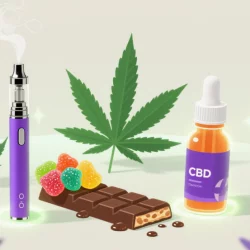Marijuana Laws in Utah
Utah is situated between two states that treat marijuana possession very differently. On the western border of the Beehive State is Nevada, where Nevada Medical Marijuana Program (NMMP) cardholders may legally possess 2 ½ ounces of usable marijuana in any one 14 day period. To the east is Colorado, which in 2014 became the first state in the country to legalize the recreational use of cannabis.
People passing through the Salt Lake City area should be aware that pot remains a controlled substance in Utah. Whether people simply have the drug in their possession or they are attempting to sell it within the state, criminal charges can result.
Utah Code § 58-37-2 states that marijuana is defined as "all species of the genus cannabis and all parts of the genus, whether growing or not." This not only includes the plant, but every compound and any synthetic equivalents. Under Utah Code § 58-37-8, a person can face the following penalties for knowingly and intentionally possessing marijuana in Utah:
- Less than one ounce of marijuana - Class B misdemeanor for first conviction, class A misdemeanor for a second conviction, third degree felony for a third or subsequent conviction
- More than one ounce, but less than 16 ounces - Class A misdemeanor
- More than 16 ounces, but less than 100 pounds - Third degree felony
- 100 pounds or more - Second degree felony
If a person is convicted of cannabis possession, the consequences depend on the classification of the offense:
- Class B Misdemeanor - Up to six months in jail and $1,000 fine
- Class A Misdemeanor - Up to 12 months in jail and $2,500 fine
- Third Degree Felony - Up to five years in prison and $5,000 fine
- Second Degree Felony - Up to 15 years in prison and $10,000 fine
Additionally, a marijuana possession charge can be subject to enhanced penalties if an alleged sale occurred within the presence of a minor or within 1,000 feet of the following "drug-free" locations:
- Amusement Park
- Church
- Public Park
- Public Parking Lot
- Recreation Center
- School
- Shopping Mall
- Sports Facility
- Synagogue
- Theater
Any of these enhanced charges can trigger the level of the offense to the next highest degree, except in first degree felony cases that will result in a five-year mandatory minimum prison sentence. Prosecutors still have to meet their burdens of proof when attempting to charge a person with possession of marijuana or intent to distribute, and it is important to understand that any errors police officers make during the arrest process can lead to evidence being suppressed and the charges against a person being dismissed.
Darren Levitt is the founder and manager of Levitt Legal, PLLC in Salt Lake City. He is a criminal defense attorney who handles marijuana charges and is licensed to practice in state courts and the Federal District Court for the District of Utah.
More to Read:
Previous Posts:






